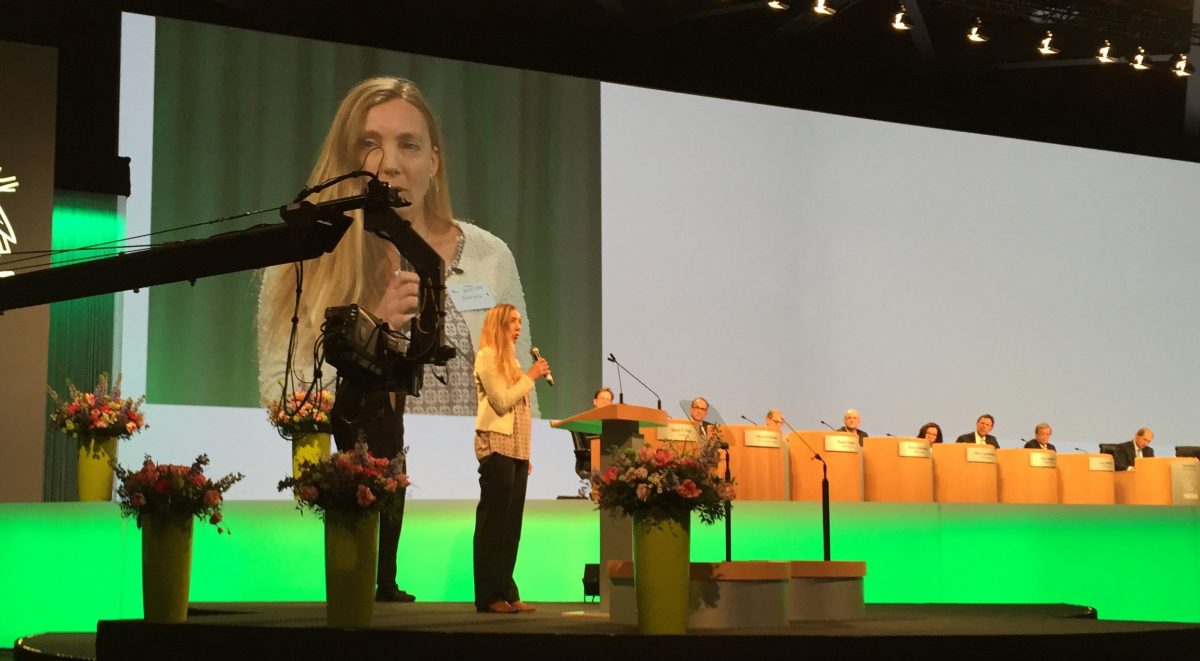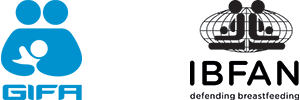
Speech given by IBFAN-GIFA to the Nestlé General Assembly
7th April 2016
Ladies and gentlemen, members of the board, Mr. President, good afternoon.
My name is Rebecca Norton. I am trained in public health and specialized in breastfeeding. I am speaking on behalf of the Geneva Infant Feeding Association, the international liaison office of IBFAN. In official relations with the World Health Organisation, we are also funded by the directorat of health of the Canton of Geneva.
To mark this 150th anniversary, and World Health Day celebrated today, we would like to start by welcoming the fact that Nestlé, as stated on page 60 of the report « Creating Shared Values », has finally recognized WHO’s international recommendations on breastfeeding, in full. This is a welcome change, for which IBFAN has been asking for a number of years.
However: Why, here in Switzerland, as in many other countries, are parents still being misled by Nestlé’s marketing practices ? Why does one still read, on adverts or Nestlé products, that ‘WHO recommends exclusive breastfeeding during the first 6 months’ ? What about the second part of the WHO recommendations, to continue breastfeeding for 2 years or beyond ? Is this an omission ? or is it a subtle marketing strategy to incite consumption of follow-on formulas.
Yet, General Comment 15 on article 24, on the right to health, of the Convention of the Rights of the Child’s, clearly spells out the fact that the private sector has to conform at all levels to the International Code of Marketing of Breastmillk Substitutes and World Health Assembly resolutions. In February 2015, the United Nations Committee of the Rights of the Child also recommended to Switzerland to strictly apply the international code. Lastly, WHO, and recently UNICEF Switzerland, have clarified that follow-on milks are not necessary.
When can we expect Nestlé to « walk its talk », and to act upon all the nice declarations that we can read in the Creating Shared Values report ? What about the sound values and principles, the importance of respecting human rights and international norms- all of them nicely spelt out in this report ? Are they still valid when it comes to marketing ?
If Henri Nestlé were still here today, with these same values, and if he knew everything we know today about the importance of breastfeeding for children, and mothers, everywhere in the work, including in Switzerland, would he not act differently, and strive instead to ensure that artificial milks, although useful for some, are ethically marketed in compliance with international standards and human rights?
We dare to think that he would, and this 150th anniversary is for us the opportunity to ask Nestlé, once again, to honor its engagements by putting child health and rights before marketing and profits.
Thank you for your attention.
Response from Peter Brabeck, Chairman and CEO of Nestlé :
Mr. Brabeck said that he did not dare ask Rebecca Norton when she was born, but that it seemed that the commitment that Nestlé has toward the WHO Code may be date back to before she was born, and that we must not forget that it was Nestlé who recommended creating the WHO Code in the first place. He added that ever since it was established, Nestlé has been commited to respect the Code. He therefore said that it was exaggerated to come and tell him today that Nestlé respects the Code at last. He said that such a statement could only be explained by Rebecca Norton’s youth and that he understood this.
Mr. Brabeck then asked Heiko Schipper, in charge of Nestlé Nutrition, to provide some additional information.
Before mr. Schipper took the floor, Rebecca Norton quickly pointed out that firstly, she was older than Mr. Brabeck thought and was born before the Code, and she also added that he must have known this very well. Secondly, she pointed out that when she was referring to the fact that N at last acknowledged the WHO recommendations in the Nestlé Creating shared value report, she was referring to the WHO recommendations on breastfeeding, i.e. exclusive breastfeeding until 6 months, and continued breastfeeding until 2 years or beyond.
Mr. Schipper then took the floor : He started by reiterating the way in which Nestlé approaches human nutrition, especially in this special year. He highlighted the fact that N. was committed to nutrition in the first 1000 days and that this included, as always stated by Nestlé, breastmilk as the best start in life. He pointed out that this commitment went back 150 years, if one were to read their first label and that this will remain at the heart of what Nestlé does.
He went on to say that, when breastfeeding was not possible, infant formula was essential for babies and this was also recognized by the WHO code. He said that when it came to marketing their products, Nestlé pledges to do so responsably, and was today the only company in the industry that goes beyond local laws and sets a strict standard for the marketing of our infant formula products. He added „We have the strictest policies in place and the implementation of these is not only monitored internally but also externally.“ He stated that in 2015, 43 countries were audited on these practices. « The fact that we have the strictest policies in place also is recognised externally ; last year this was recognised by the important Access to nutrition index that rated us first in the industry and and we also remain until today the only company that is in the Footsie for good index. »
Lastly, he highlighted that Nestlé also takes concrete actions to promote breastfeeding. He said that most mothers in the world start breastfeeding but are often not able to sustain it until 2 years, a key reason for this being that they have to go back to work. In 2015, Nestlé put in place a policy so that globally all mothers who work in the company can take maternity leave until 6 months and all those who go back to work have the opportunity to continue breastfeeding in one of the 275 rooms on their premises.
He ended by saying that this illustrates that not only do Nestlé has the strictest policies in place but also takes very concrete actions to support breastfeeding.
Rebecca Norton congratulated Nestlé on what was done to for maternity protection, but added that Nestlé did not respect the WHO code in Switzerland.
Mike Brady, from Baby Milk Action/IBFAN UK, also took the floor and invited shareholders to stand for a minute of silence to remember the babies that died in the 150 years of Nestlé’s history.
